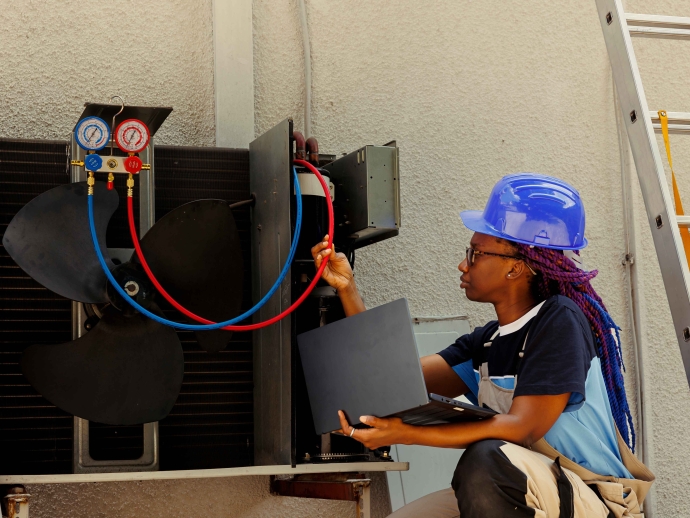Efficient HVAC System Tips for Homeowners in Cold Climates

Did you know that up to 30% of a home’s heat loss happens due to an inefficient HVAC system? If you live in a cold climate, ensuring your HVAC system runs efficiently is key to cutting energy costs and staying comfortable. As energy prices rise, it’s more important than ever to optimize your heating, ventilation, and air conditioning (HVAC) system. This guide provides practical, actionable strategies to enhance your system’s performance during the coldest months while improving energy efficiency and lowering your utility bills.
1. Regularly Replace or Clean Air Filters
Your HVAC system’s air filters play a crucial role in maintaining indoor air quality, system efficiency, and reducing energy consumption. Dirty or clogged filters restrict airflow, forcing your system to work harder and leading to increased energy use and higher utility bills.
Why Clean Air Filters Matter
-
Clogged filters cause higher energy consumption.
-
Reduced airflow can damage HVAC components.
-
Poor air quality leads to humidity problems and worsens allergies.
-
Dirty filters increase heating costs, especially in winter.
Maintenance Schedule
-
Check filters monthly during peak heating and cooling seasons.
-
Replace standard filters every 30-90 days.
-
High-efficiency filters may last up to 6 months.
-
Homes with pets or allergy sufferers should change filters more frequently.
A simple habit like changing your air filter can make a noticeable difference in your system’s efficiency.
2. Seal Drafts and Insulate Your Home
A well-insulated and draft-free home helps maintain indoor temperatures efficiently, reducing energy waste and strain on your heating system.
Common Draft Areas
-
Window frames and sills
-
Door frames and thresholds
-
Electrical outlets on exterior walls
-
Attic hatches and basements
-
Pipe and cable entry points
Effective Sealing Solutions
-
Apply weatherstripping around doors and windows.
-
Use caulk for cracks and gaps in walls.
-
Install foam gaskets behind electrical outlet covers.
-
Add door sweeps to block cold air from entering.
Insulation Improvements
-
Attic insulation is a top priority, as most heat escapes through the roof.
-
Wall cavity insulation boosts overall energy efficiency.
-
Basement insulation helps with moisture control and temperature regulation.
-
Choose insulation materials with appropriate R-values for your climate zone.
Proper insulation and sealing drafts significantly improve HVAC performance and help maintain comfortable indoor temperatures.
3. Schedule Professional HVAC Maintenance
Regular professional HVAC maintenance is crucial for prolonging system life, maintaining efficiency, and preventing costly breakdowns.
Pre-Season Inspection Checklist
-
Check and tighten electrical connections.
-
Clean heating components, heat exchangers, and burners.
-
Inspect for cracks in the heat exchanger.
-
Calibrate the thermostat for accurate temperature control.
-
Lubricate moving parts like fans and air handlers.
-
Perform carbon monoxide testing for safety.
-
Measure and adjust airflow for balanced heating.
Benefits of Professional Maintenance
-
Prevents unexpected system failures in freezing temperatures.
-
Extends the lifespan of your HVAC unit.
-
Ensures compliance with energy-saving tax credits.
-
Lowers utility costs by optimizing efficiency.
-
Keeps manufacturer warranties valid.
Scheduling maintenance before winter ensures your system is prepared for peak performance.
4. Optimize Thermostat Settings
Smart temperature management is key to maximizing efficiency and reducing energy waste.
Recommended Thermostat Settings
|
Time |
Temperature (F) |
|
Daytime (Home) |
68-70°F |
|
Nighttime or Away |
62-65°F |
|
Vacation Mode |
55°F |
Advantages of Smart Thermostats
-
Automates temperature adjustments for optimal efficiency.
-
Allows remote control via smartphone apps.
-
Tracks energy usage to monitor savings.
-
Learns user habits to create custom heating schedules.
-
May qualify for utility rebates and incentives.
Installing a smart thermostat can significantly reduce energy consumption while improving home comfort.
5. Ensure Proper Ventilation
Proper ventilation prevents stale air, humidity buildup, and uneven heating.
Ventilation Maintenance Tips
-
Keep vents and registers unobstructed.
-
Clean vent covers monthly to reduce dust buildup.
-
Arrange furniture away from vents to maintain airflow.
-
Balance airflow between rooms to avoid cold spots.
-
Schedule duct cleaning every 3-5 years for better efficiency.
Signs of Poor Ventilation
-
Uneven temperatures between rooms.
-
Stale air or high humidity levels.
-
Dust accumulation around vents.
-
Higher energy bills than normal.
-
Persistent odors indicating air stagnation.
Good ventilation enhances air circulation, making your heating system work more efficiently.
6. Consider Upgrading to an Energy-Efficient HVAC System
If your HVAC system is outdated, an upgrade can drastically improve efficiency and reduce costs.
When to Upgrade
-
Your system is over 15 years old.
-
Frequent repairs are needed.
-
Rising energy bills with no change in usage.
-
Inconsistent heating leads to discomfort.
-
Excessive noise or malfunctions occur.
Benefits of Modern Systems
-
Higher AFUE ratings (95%+ efficiency).
-
Variable-speed technology for precise control.
-
Lower electricity consumption.
-
Quieter operation with radiant heating options.
-
Integration with smart home technology.
Professional Assessment Considerations
-
Home size and layout impact heating needs.
-
Local climate conditions affect energy efficiency.
-
Renewable energy options like solar heating.
-
Budget and long-term savings goals.
Upgrading to an energy-efficient system reduces energy bills and enhances long-term comfort.
Conclusion
Maintaining an efficient HVAC system in cold climates requires a proactive approach. By regularly maintaining your HVAC system, sealing drafts, optimizing thermostat settings, and ensuring proper ventilation, you can improve efficiency and lower costs. If your system is aging, consider upgrading to a more energy-efficient model.
Don’t wait for winter to put your HVAC system to the test! Schedule a professional assessment today to optimize your system for maximum efficiency and comfort.
Need expert help? Our certified HVAC technicians specialize in cold-climate heating solutions, including ground source heat pumps and smart HVAC integrations. Contact us today for a consultation.

